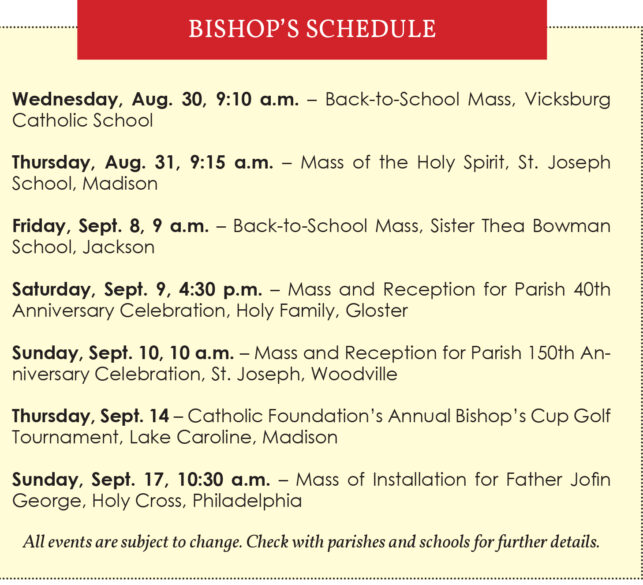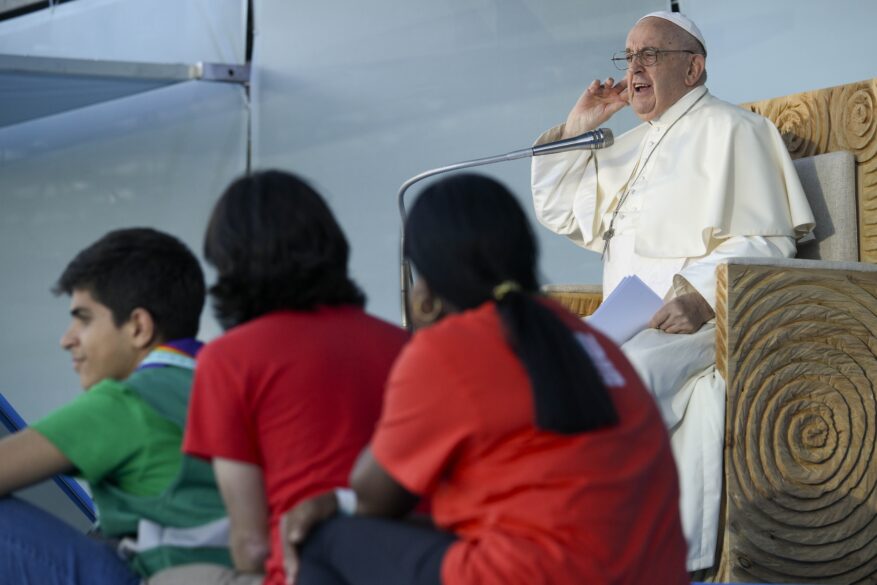By Bishop Joseph R. Kopacz, D.D.
“Todos, Todos, Todos” was Pope Francis’ heartfelt declaration during World Youth Day in Lisbon, Portugal earlier this month. This Spanish mantra states that all are welcome, the baptized especially, to come into the presence of God within the Catholic Church to know the transforming love of Jesus Christ.
Young and older, from nearly every nation on the planet were on hand to celebrate with the successor of Peter, the Servant of the Servants of our merciful God. What a marvelous manifestation of the church’s identity and mission in Lisbon, encapsulated as One, Holy, Catholic and Apostolic, the focus of our own pastoral reimagining. This universal vision for the church begun on the first Pentecost, actually began to emerge early in the Old Testament. However, it came to fulfillment in the life-giving death and resurrection of the Lord, and in the outpouring of the Holy Spirit. But the Cross reminds us that this vision of unity among all the nations in the church labors to run its course and requires repentance, conversion and sacrifice to overcome the sin that sows division.

The Canaanite woman of last Sunday’s Gospel is an excellent point of departure to look back into the wellspring of the Old Testament. Her unexpected and anguished plea to Jesus on behalf of her possessed daughter began with the greeting, “Lord, son of David, have pity on me.” Jesus was actually speechless for a moment over this pagan woman’s clear grasp of his identity. Respecting her courage and faith, he reminded her of the Israelite attitude and prejudice toward foreigners that “it is not right to take the food of the household and give it to the dogs.”
“But even the dogs eat the scraps that fall from the master’s table” was the desperate woman’s retort. The Lord responded in awe over her faith, and in that instant this “unclean woman’s” daughter was healed. This is a fascinating encounter with the Lord that challenges us to go deeper in our knowledge and understanding of God’s will. The Old Testament holds this key.
The Book of Ruth is a parable, a narrative that confronted the harsh policies of the Israelites in the time of Ezra as they returned home from exile. (Ezra 10) Basically, Ezra was directing the Israelites to leave their foreign wives where they found them because they had been unfaithful to the Covenant.
In this mindset God does not want the blood of foreigners polluting the chosen people’s lineage. Really! Enter the Book of Ruth. It is an endearing story of a Moabite women, a pagan, who chose to return to the land of Israel with her Jewish mother-in-law, Naomi. Ruth’s words are forever enshrined in our biblical memory. “Wherever you go, I shall go. Wherever you live, I shall live. Your people shall be my people and your God, my God. Wherever you die, I wish to die, and so be buried beside you.” (Ruth 1:16-17) The hand of providence placed Ruth in the direct line of the story of salvation as the great-grandmother of King David from whose lineage came the Messiah, the Son of David. The seeds of universality were already sprouting even before King David sat on the throne of Israel.
There is nothing subtle or hidden about Isaiah’s prophecy in last Sunday’s first reading as he anticipates the Great Commission of the Lord at the end of Matthew’s Gospel. “My house will be a house of prayer for all the peoples.” (Isaiah 56:7) All who are righteous are invited to the banquet of God’s love. “On this mountain the Lord Almighty will prepare a feast of rich food for all peoples, a banquet of aged wine – the best of meats and the finest of wines.” (25:6)
The story of the prophet Jonah is another masterpiece of God’s plan for universal salvation. His preaching prompted the citizens of Nineveh, from the King on down, to sincere repentance. As it turns out, Jonah deeply resented God’ action in granting mercy to the hated Assyrians who had destroyed the northern Kingdom of Israel. Too bad for Jonah. The prophet’s three days in the belly of the fish prefigured the Lord’s three days in the tomb and his resurrection from the dead, the final step in the plan of universal salvation. The letter to the Ephesians captures the essence of the Lord’s sacrifice.
“But now in Christ Jesus you who once were far away have been brought near through the blood of Christ. And in this one body to reconcile both of them to God through the cross, by which he put to death their hostility. He came and preached peace to you who were far away and peace to those who were near.” (Eph 2:13,16-17)

In our own time, we need to put to death hostility wherever it rears its ugly head and hear the call of the Gospel that rings true in the words of Pope Francis at World Youth Day. Todos, Todos, Todos. This, of course, is the great commission of the Lord “to make disciples of all the nations” (Matthew 28:19) one person, one family, one community, one nation at a time. With the invitation comes the call to repentance, conversion and change with the same attitude of Peter, the first pope, after Jesus had invited himself into his boat. Peter, overwhelmed by God’s grace with the enormous catch of fish exclaimed, “leave me Lord for I am a sinful man.” (Luke 5:8)
Our diocese is blessed with the faithful from many nations, a truly Catholic presence. In light of the above, we can say that a welcoming attitude, faith, prayer, compassion, repentance and conversion are ever-ancient and ever-new components on the journey of salvation. Even though our efforts may seem meager at times, now and then even a scrap that falls from the Master’s table is enough to start the feast.

